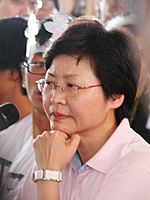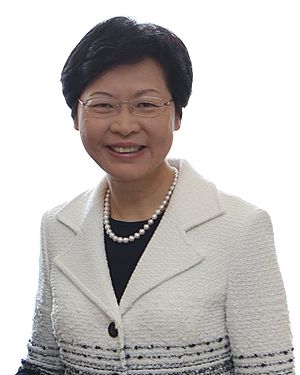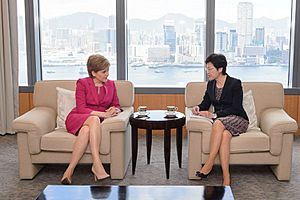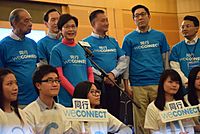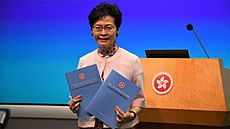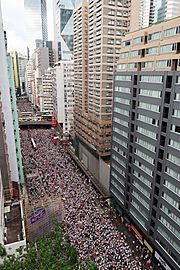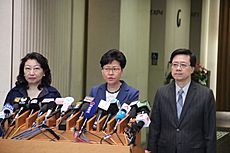Carrie Lam facts for kids
Quick facts for kids
Carrie Lam Cheng Yuet-ngor
GBM GBS JP
|
|||||||||||||||||||||||||||||||
|---|---|---|---|---|---|---|---|---|---|---|---|---|---|---|---|---|---|---|---|---|---|---|---|---|---|---|---|---|---|---|---|
|
林鄭月娥
|
|||||||||||||||||||||||||||||||
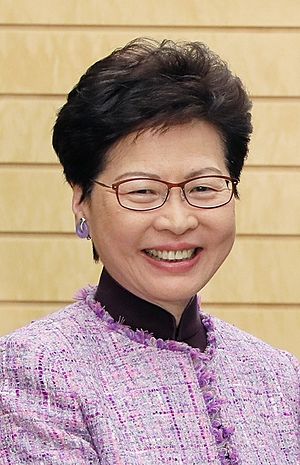
Lam in 2019
|
|||||||||||||||||||||||||||||||
| 4th Chief Executive of Hong Kong | |||||||||||||||||||||||||||||||
| In office 1 July 2017 – 30 June 2022 |
|||||||||||||||||||||||||||||||
| President | Xi Jinping | ||||||||||||||||||||||||||||||
| Premier | Li Keqiang | ||||||||||||||||||||||||||||||
| Preceded by | Leung Chun-ying | ||||||||||||||||||||||||||||||
| Succeeded by | John Lee Ka-chiu | ||||||||||||||||||||||||||||||
| Chief Secretary for Administration | |||||||||||||||||||||||||||||||
| In office 1 July 2012 – 16 January 2017 |
|||||||||||||||||||||||||||||||
| Chief Executive | Leung Chun-ying | ||||||||||||||||||||||||||||||
| Preceded by | Stephen Lam | ||||||||||||||||||||||||||||||
| Succeeded by | Matthew Cheung | ||||||||||||||||||||||||||||||
| Secretary for Development | |||||||||||||||||||||||||||||||
| In office 1 July 2007 – 30 June 2012 |
|||||||||||||||||||||||||||||||
| Chief Executive | Donald Tsang | ||||||||||||||||||||||||||||||
| Preceded by |
|
||||||||||||||||||||||||||||||
| Succeeded by | Mak Chai-kwong | ||||||||||||||||||||||||||||||
| Personal details | |||||||||||||||||||||||||||||||
| Born |
Cheng Yuet-ngor
13 May 1957 Wan Chai, British Hong Kong |
||||||||||||||||||||||||||||||
| Nationality |
|
||||||||||||||||||||||||||||||
| Spouse |
Lam Siu-por
(m. 1984) |
||||||||||||||||||||||||||||||
| Children | 2 | ||||||||||||||||||||||||||||||
| Education | St. Francis' Canossian College | ||||||||||||||||||||||||||||||
| Alma mater | |||||||||||||||||||||||||||||||
| Occupation |
|
||||||||||||||||||||||||||||||
| Signature | |||||||||||||||||||||||||||||||
| Chinese name | |||||||||||||||||||||||||||||||
| Traditional Chinese | 林鄭月娥 | ||||||||||||||||||||||||||||||
| Simplified Chinese | 林郑月娥 | ||||||||||||||||||||||||||||||
|
|||||||||||||||||||||||||||||||
Carrie Lam Cheng Yuet-ngor (born 13 May 1957) is a retired politician from Hong Kong. She served as the fourth Chief Executive of Hong Kong from 2017 to 2022. Before that, she was the Chief Secretary for Administration for five years.
After finishing her studies at the University of Hong Kong, Carrie Lam joined the government service in 1980. She worked in many different government departments. She became a very important official in 2007 when she was made Secretary for Development. During this time, she was known as a "tough fighter" because of her role in the removal of the Queen's Pier in 2008.
In 2012, Lam became the Chief Secretary for Administration. This is the second-highest position in the Hong Kong government. From 2013 to 2015, she led a group working on changes to how elections are held in Hong Kong. She also talked with student and opposition leaders during the large protests in 2014. In 2017, Carrie Lam was chosen as the Chief Executive. She was the first woman to hold this top job in Hong Kong.
Her time as Chief Executive had many challenges. Her government was criticized for several policies. In 2019, she proposed a law about sending people to mainland China for trials. This led to huge protests that lasted for many months. Even though the bill was stopped, the protests continued with people asking for more changes. The protests slowed down when the COVID-19 pandemic started.
In July 2020, the Chinese Government introduced a new national security law for Hong Kong. This law was criticized for limiting freedoms in the city. In April 2022, Carrie Lam announced she would not seek another term as Chief Executive. She said she wanted to spend more time with her family. She was replaced by John Lee Ka-chiu on 1 July 2022.
Contents
Early Life and Education
Carrie Lam was born Cheng Yuet-ngor on 13 May 1957. She grew up in a small, shared apartment in Wan Chai, Hong Kong. She was the fourth of five children in her family. Her father was from Shanghai and worked on ships.
She went to St. Francis' Canossian College, a Catholic girls' school, where she was a top student. After school, she attended the University of Hong Kong. She was involved in student activities and met future pro-democracy leaders there. She first studied social work but changed to sociology to understand society better. She graduated in 1980.
In 1982, the Hong Kong government helped her study further at the University of Cambridge in the United Kingdom. There, she met her future husband, Lam Siu-por, who is a mathematician. She received an advanced diploma from Cambridge.
Working for the Government
Carrie Lam started her career in the Hong Kong government in 1980. She worked in many different offices and departments. She spent about seven years in the Finance Bureau, where she helped plan budgets and control spending.
In 2000, she became the Director of the Social Welfare Department. This was a time when many people in Hong Kong were unemployed. She made some rules stricter for social welfare help. She also helped create a fund to support children whose parents died during the SARS epidemic in 2003.
Later, she worked as the Director-General of the Hong Kong Economic and Trade Office in London from 2004 to 2006. She returned to Hong Kong in 2006 to work in the Home Affairs Bureau. She was involved in planning for the 2008 Beijing Olympics events held in Hong Kong.
Secretary for Development
On 1 July 2007, Carrie Lam became the Secretary for Development. This was a very important role. Early in her time in this job, she oversaw the removal of the Queen's Pier. This caused protests from people who wanted to save the pier.
She met with protesters to explain the government's decision. She said the pier could not be saved. Her firm stance during this time earned her the nickname "tough fighter." She also worked on new plans for city renewal.
Chief Secretary for Administration
In 2012, Carrie Lam became the Chief Secretary for Administration. This is the second-highest position in the Hong Kong government. Her popularity changed during this time, especially during a debate about national education in schools.
Political Changes and Protests
In 2013, she led a group looking at how to change Hong Kong's election system. In 2014, the Chinese government set rules for the 2017 Chief Executive election. This led to large protests that lasted for 79 days.
During the protests, Lam had a televised debate with student leaders. She explained that their ideas for elections did not fit within the existing laws. The protests caused her approval ratings to drop. The proposed election changes were not passed in 2015.
Other Challenges
Lam faced criticism during a scandal about lead in drinking water. She was the only top official who did not apologize. She said officials did not break laws.
She also caused discussion when she spoke at an event in 2015. She quoted a religious saying, suggesting she was "blessed" for facing challenges. Some people found her comments arrogant.
In December 2016, Lam was criticized for a plan to build a Hong Kong Palace Museum. People said there was no public discussion about it. This happened just before she decided to run for Chief Executive.
Running for Chief Executive
Carrie Lam announced her plan to run for Chief Executive on 12 January 2017. She presented her ideas for Hong Kong's future. Many important pro-Beijing figures and business leaders supported her.
Reports said that top Chinese officials had decided to support Carrie Lam for the election. She submitted her nomination with 579 votes from the Election Committee. She did not get any support from the pro-democracy side.
On 26 March 2017, Carrie Lam was elected Chief Executive with 777 votes. She became the first female leader of Hong Kong. She promised to "heal the social divide" and "unite our society."
As Chief Executive
Carrie Lam officially became Chief Executive on 1 July 2017. She was sworn in by Xi Jinping, the President of China. This was on the 20th anniversary of Hong Kong becoming a Special Administrative Region.
Challenges to Freedoms
Soon after she took office, four pro-democracy lawmakers were removed from their positions by a court decision. This made relations between the government and pro-democracy groups worse. Later, other pro-democracy candidates were also not allowed to run in elections.
In 2018, the police tried to ban the Hong Kong National Party, a group that supported Hong Kong independence. The police said the party was a threat to national security. Carrie Lam supported this decision.
A journalist, Victor Mallet, was denied a work visa after he hosted a talk with a leader of the Hong Kong National Party. Carrie Lam refused to comment on why his visa was denied.
Big Building Projects
The Lam government proposed a plan for the Guangzhou–Shenzhen–Hong Kong Express Rail Link. This plan allowed Chinese customs officers to work inside Hong Kong's train station. Some people worried this would go against Hong Kong's special "One Country, Two Systems" rule.
Carrie Lam defended the plan. She said some Hong Kong lawyers thought their legal system was better than mainland China's. The plan was passed in 2018. The Express Rail Link and the Hong Kong–Zhuhai–Macau Bridge opened later that year.
In October 2018, Lam announced a huge plan called "Lantau Tomorrow Vision." This plan involved building new islands by reclaiming land from the sea. The project was very expensive and raised environmental concerns.
Other Issues in 2018-2019
In December 2018, the government decided not to take further action against former Chief Executive Leung Chun-ying over a payment he received. Carrie Lam defended this decision.
In January 2019, the government announced changes to welfare payments for elderly people. The age to receive help was raised from 60 to 65. This caused a lot of anger from lawmakers and the public. Lam later changed the plan to help those affected.
The government also had a plan to give HK$4,000 to adult residents who did not own property. The application process was criticized for being too difficult. The government later made it simpler.
Carrie Lam's approval ratings dropped during this time. She admitted that people were questioning her government's ability to lead.
Anti-Extradition Bill Protests
In mid-2019, the Lam government proposed a law that would allow people to be sent to mainland China for trials. This caused huge opposition. People worried it would threaten Hong Kong's legal system. Lam insisted on moving forward with the bill. She said foreign powers were making the issue worse.
On 9 June 2019, over a million people marched against the bill. The government still planned to discuss the bill on 12 June. On that day, protests outside government buildings turned violent. Lam appeared in a TV interview, saying she had not betrayed Hong Kong. She said she had "sold herself to Hong Kong" and would not withdraw the bill. However, she later called the protests a "riot."
After more intense clashes, Carrie Lam announced on 15 June that the bill would be paused. On 16 June, nearly two million people protested peacefully, demanding the bill be fully withdrawn. Lam apologized to Hong Kong residents and said the bill was suspended.
The protests continued and became more intense. On 1 July, some protesters broke into the Legislative Council building. Lam refused to agree to the protesters' five main demands. These included fully withdrawing the bill, investigating police actions, and allowing more democratic elections.
In August 2019, Lam's support dropped to a very low level. A recording was leaked where she said she would quit if she had a choice. On 4 September, Lam formally withdrew the extradition bill. However, she did not agree to the other demands. She held one public dialogue session but no more followed.
On 4 October, Carrie Lam used an emergency law to ban people from wearing face masks at public gatherings. This led to more protests.
Election Defeat and Impeachment Attempt
In November 2019, local elections were held. Pro-democracy groups won a huge number of seats. Carrie Lam said her government would "listen humbly" and "seriously reflect" on the election results.
In December, pro-democracy lawmakers tried to remove Lam from office. They said she had failed in her duties. The attempt was not successful, but Lam was criticized by lawmakers from both sides.
COVID-19 Outbreak
The protests and the government's initial handling of the coronavirus outbreak caused Carrie Lam to lose more public support. Her approval rating dropped to a record low in early 2020.
In March 2021, Lam said people were not getting vaccinated fast enough. She also criticized some medical workers for spreading "fake news" about vaccines. In August 2021, she announced that some workers would need to be vaccinated or get regular tests.
National Security Law
In May 2020, Beijing announced a plan for a new national security law for Hong Kong. This law would make certain actions like separatism and subversion illegal. Many people saw this as a way to limit freedoms. Carrie Lam welcomed the law and said her government would cooperate.
In October 2020, the United States government placed sanctions on Carrie Lam and other officials. They said these officials were undermining Hong Kong's freedom. As a result, Lam said she had to use cash for everything because she could not use banking services. She said she considered it an "honor" to be sanctioned.
In November 2020, Lam said the national security law was "remarkably effective." She also said she did not feel guilty for the protests that led to the law. In January 2021, she said the law protects rights and freedoms. However, in August 2021, she said that rights might have to give way for "more important goals" like national security.
In March 2021, Lam said museums would need to be careful that exhibits did not break the national security law. In January 2022, she said the government would add more crimes under the law.
Democratic Reform
In November 2020, Lam said she had once hoped for democratic reform in Hong Kong, but that it would only divide society. She said full democracy would not happen until Hong Kong's political system was "restored." In March 2021, she said Hong Kong could still move towards full democracy.
In September 2021, she said Hong Kong's new election rules, which only allow "patriots" to run, were a "democratic system that suits Hong Kong better." In November 2021, she said it was "wrong" to think Beijing "owes" Hong Kong full democracy.
Other Criticisms
In November 2020, Lam said that teachers were partly to blame for the 2019-2020 protests. She said the government would take action against "incompetent" teachers.
In 2017, Lam had promised to extend anti-bribery laws to cover the Chief Executive position. In December 2020, she changed her mind, saying it would affect her role.
In February 2021, Lam said Hong Kong would start enforcing a law that does not recognize dual nationality for people of Chinese descent born in Hong Kong. This means they would be considered Chinese nationals, even if they had other passports.
In February 2021, after a Chinese official said only "patriots" could govern Hong Kong, Lam defended Beijing's involvement. She denied that her performance was the reason for this decision.
In December 2021, after a news outlet called Stand News was shut down, Lam denied that press freedom was being suppressed. She said the government takes action when media outlets break the law.
In January 2022, Lam criticized the leaders of Cathay Pacific airline after an employee broke quarantine rules and spread COVID-19. A few days later, after many government officials attended a large birthday party that led to a COVID-19 cluster, Lam changed her stance and said she would not take responsibility for their actions.
After Chief Executive
In July 2022, lawmakers criticized the high cost of Carrie Lam's new office after she left her role. In April 2023, her office had spent a lot of money.
In November 2022, Lam said she planned to promote the "One country, two systems" idea to Taiwan. In February 2023, she became an honorary president of the Hong Kong Chamber of Commerce in Jiangsu province.
Personal Life
In 1984, Carrie Lam married Lam Siu-por, a mathematician she met in Cambridge. They have two sons, Jeremy and Joshua, who both studied in the United Kingdom. Joshua is studying for a PhD in mathematics in the United States.
Her eldest son, Jeremy, joined an electronics company in Beijing in 2016. Carrie Lam's husband and both sons are British citizens. Carrie Lam herself gave up her British citizenship in 2007 to take on a top government role in Hong Kong. She is a Catholic and did not join the Chinese Communist Party because it would mean giving up her faith.
Honours and Awards
Carrie Lam has received several awards for her work and contributions. She was given the Gold Bauhinia Star in 2010 and the Grand Bauhinia Medal in 2016. She also received an honorary degree from Lingnan University in 2013 and an award from the French government in 2015.
She was also given an honorary fellowship from Wolfson College, Cambridge. However, during the 2019 protests, some people asked the university to take back her award. On 15 August 2020, Lam announced that she had returned her honorary fellowship. She said she was disappointed that the college had criticized her unfairly. Wolfson College said they had concerns about her commitment to human rights and freedom of speech.
Carrie Lam is on a list of "Press freedom predators" by Reporters Without Borders.
See also
 In Spanish: Carrie Lam para niños
In Spanish: Carrie Lam para niños
- 2019–20 Hong Kong protests
- Executive Council of Hong Kong
- Hong Kong national security law
- Lam government
 | Mary Eliza Mahoney |
 | Susie King Taylor |
 | Ida Gray |
 | Eliza Ann Grier |


